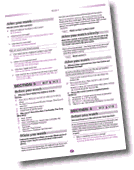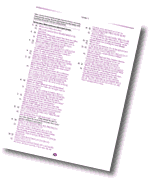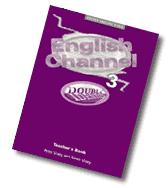|
|
||||
|
|
|
|
|
|
|
|
Page 2 of 4 Go to the Want
to print this
|
|
|
|
 Enlarge |
Sample
from Episode 2 |
|
The
Story So Far, episode 1 |
 Enlarge |
Various notes from Episode 2
2 Look at the body language. Imitate the actions. Match the sentences. Then replace 'he' and 'his' with the correct names.
If students are not used to discussing non-verbal communication, this might appear to be an intimidating task (!). However, it's easier than it appears. Have students physically imitate the actions in column 1 and ask them how they feel while they're in the relevant poses.
intimidating is just 'frightening' in a basic dictionary, but more accurately it's 'trying to make someone feel small, or powerless.'
defensive means you feel you are under verbal attack or criticism, and you're trying to protect yourself and your opinions.
tense is the opposite of relaxed - have students tense and relax their hands.
ready for action - he is able to jump to his feet and start doing things in a second if it becomes necessary
2 Are they using the British or American meaning of 'professor'?
British. 'professor' just means 'teacher' in many languages, but in Britain it is a very senior position in a university.
You could check other items in the definition - pronunciation, [C] for 'countable', 'noun', 'AmEng'
Check 'sincere' / 'insincere' (For some languages, 'sincere' is something of a false friend, but the slight difference in meaning should not affect their ability to do this exercise). It's best to leave this to their speculation - some may think that Alan is lying.
Talk about the picture.
As one theme is forms of address and degrees of formality, you could expand on the communication topic of stance and position. Ask what it shows about status. This is the first place where students learn that the policeman in a blue raincoat is a sergeant.
ich case, how did he get there?
The extension in this unit focusses on a communication skill- the appropriate choice of forms of address and names. This may seem radical to some students who will be expecting a grammar or function-based topic, or information.
Dr Burbage said:
'I shall have to call the police.'
'Unfortunately, I have to say this.'
Dr Burbage's two remarks demonstrate the use of have to for an "external obligation" in contrast to an internal obligation, where must is generally preferred. There is an aspect of additional politeness in using have to. If you say, I must go this means it is an internal obligation, so it is probably your choice. If you say I have to go you are implying an external obligation, i.e. it is not your choice, but something imposed on you from outside.
Obviously, Dr Burbage is being polite (and probably quite insincere) in saying that he has to do these things.
Fact and Fiction (from the introduction):
"Double
Identity" is a fictional story which takes place in a real
location in and around Oxford. It is important to be aware
of the border between fact and fiction in the story,
particularly where students may go on to study literature.
We would not want students to cite 'The Falcon of Malta' as
a Shakesperean play in exams.
General facts about Shakespeare, The Civil War and the
University of Oxford are true. We do not suggest
communicating the information below to your students unless
they are particularly interested!
THE FALCON OF MALTA
Not only did Shakespeare not write this play, but no similar
play is known. The title echoes real plays like 'The
Merchant of Venice,' 'Timon of Athens,' 'The Merry Wives of
Windsor,' and 'Two Gentlemen of Verona'. As we hint on the
INFORMATION page our actual inspiration was the classic film
noire, 'The Maltese Falcon.' The information given about
Maltese falcons being given as tributes is accurate - though
in the movie there are mistakes. For example, they refer to
the Holy Roman Emperor who received tributes of falcons 'The
King of Spain' and date the tributes from 1539. They date
from 1530, and at that time Charles V was both King of spain
AND Holy Roman Emperor. The tribute was received in the
latter role.
ETHELRED COLLEGE
Ethelred College does not exist. For anyone visiting Oxford,
the exterior was filmed at the gateway (built 1509) to
Brasenose College. The interiors were filmed at the Oxford
Union Library (library scenes) and at Holywell Manor (Dr
Burbage's office- which dates back to 1516). The latter two
are not open to the public.
We named the college after the Saxon king, Ethelred the
Unready. The college's Latin motto, "Semper Paratus"
translates as "Always Ready.' This was a small in-joke. When
we were filming it was noticed (and understood) by most of
the Brasenose academic staff passing through the gate.
NEWTON COLLEGE
Newton College is fictional too. We wanted to give the idea
that this was a scientific place full of computers, so named
it after Sir Isaac Newton, the 17th century British
scientist credited with the discovery of the laws of
gravity. An apple fell on his head.
Newton College scenes were filmed in the modern part of St.
John's College (much of the college is far older and can be
seen in our video 'A
Weekend Away').
THE COUNTRY HOUSE
This was filmed at the 18th century Kirtlington Park, near
Oxford. It is not open to the public.
PLAYS AND THE CIVIL WAR
The story of the discovery of play should be reasonably
credible (though fictional). Elizabethan and Jacobean drama
was the golden age of English drama, and lasted only from
1576 to 1642. Shakespeare himself was only active as a
writer between about 1590 and 1613. When the Civil War
started, theatres were closed. The winning side, the Puritan
"Roundheads" or Parliamentary side, believed that theatre
was evil, and it was banned by the Puritans. (They also
banned Christmas and other holidays, and dancing). The
King's forces had fled to Oxford, where they established
their capital city. It seemed reasonable (at least to us)
that a play could have been hidden away in this period, and
that Oxford rather than London could have been the
location.
OTHER PLAYS BY SHAKESPEARE
Apart from "Pericles" (the 37th play) other plays have
turned up which experts believe Shakespeare may have been
involved in (e.g. The Yorkshire Tragedy). It is true that
computers can help to establish date and authorship.
Analysis indicates that Shakespeare's two final plays,
'Henry VIII' and 'Two Noble Kinsmen' were co-written with
John Fletcher. A further play, 'Cardenio' by Shakespeare and
Fletcher was performed in 1613 but no copies have ever been
found. In 1998, researchers at Aston University revealed
that their research showed that the early plays, 'Henry VI
Part I' and 'Henry VI Part II' were actually co-written with
Christopher Marlowe. Shakespeare had never acknowledged
authorship of these.



